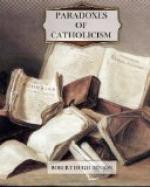(2) The second state is that in which we find ourselves when not only do all consolations leave us, but the very grip of intelligent faith goes too; when the very reasons for faithfulness appear to vanish. It is an incalculably more bitter trial, and soul after soul fails under it and must be comforted again by God in less august ways or perish altogether. And yet this is not the extremest pitch even of human desolation.
(3) For there is a third of which the saints tell us in broken words and images....
III. Our final point, for application to ourselves, is that dereliction in some form or another is as much a stage in spiritual progress as autumn and winter are seasons of the year. The beginners have to suffer one degree, the illuminated another, and those that have approached a real Union with God a third. But all must suffer it, and each in his own degree, or progress is impossible.
Let us take courage therefore and face it, in the light of this Word. For, as we can sanctify bodily pain by the memory of the nails, so too can we sanctify spiritual pain by the memory of this darkness. If He Who never left the Father’s side can suffer this in an unique and supreme sense, how much more should we be content to suffer it in lower degrees, who have so continually, since we came to the age of reason, been leaving not His side only, but His very house.
THE FIFTH WORD
I thirst.
Our Lord continues to reveal His own condition, since He, after all, is the key to all Humanity. If we understand anything of Him, simultaneously we shall understand ourselves far better.
He has shown us that He can truly be deprived of spiritual consolation; and the value of this deprivation; now He shows us the value of bodily deprivation also. And the Paradox for our consideration is that the Source of all can lose all; that the Creator needs His creation; that He Who offers us the water springing up into Life Eternal can lack the water of human life—the simplest element of all. In His Divine Dereliction He yet continues to be Human.
I. It is very usual, under this Word, to meditate on Christ’s thirst for souls; and this is, of course, a legitimate thought, since it is true that His whole Being, and not merely one part of it, longed and panted on the Cross for every object of His desire. Certainly He desired souls! When does He not?




